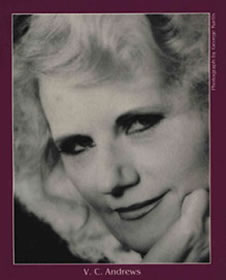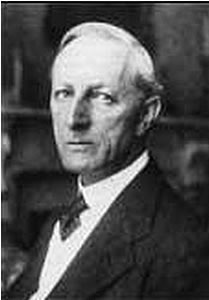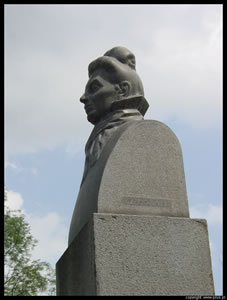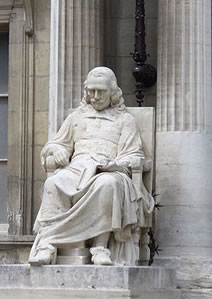De Nederlandse dichter en vertaler Hendrik van Teylingen werd geboren op 6 juni 1938 in IJmuiden. Zie ook mijn blog van 6 juni 2007 en ook mijn blog van 6 juni 2009.
Kastanjes
Als we de steen mogen geloven
Dan rust jij, Wim, vier lentes net,
Hier haast een halve eeuw al met
Je broertje Joris, dat van boven
Boem! op je buikje werd geschoven
Als veel te groot verjaarspakket –
Geen toetertje deed rettettet,
Geen wimpeltje werd rondgewoven.
Er is sindsdien maar weinig leven
Behalve soms die doffe ploffen
Zo’n zes voet boven jullie bol.
Als jullie samen nu eens even
Naar buiten kwamen, zou je boffen:
Kanstanjes, kerels! ’t Ligt hier vol!
Wanneer ik op mijn sterfbed lig
Wanneer ik op mijn sterfbed lig
(Als ik op bed verscheiden moet),
Het uitgil als een slachthuisbig
En hoest en proest van ’t roetsjend bloed
Raak dan niet in de war alsof
Er iets verschrikkelijks geschiedt
Maar zie het juist als een dikke bof
Dat ik het tranendal ontvlied
Negeer het nare sterflawaai,
Het zwaar gehik en gaar gekrijs,
Galm allemaal een psalm voor mij
En vort ben ik naar ’t paradijs.

Hendrik van Teylingen (6 juni 1938 – 25 december 1998)
Van Teylingen heette ook wel S’rî Hayeshvar Das
De Amerikaanse schrijfster V. C. Andrews (eig. Cleo Virginia Andrews) werd geboren in Portsmouth op 6 juni 1923. Zie ook mijn blog van 6 juni 2009.
Uit: Falling Stars
„Wasn’t this a terrible mistake? Even if the great vote of confidence I had received by being chosen, was I seeking to do something I could never do? Could I live so far away from home and be on my own? I had never spent a single night out of my house. I had never slept in a bed other than my own — no pajama parties with girlfriends, no family trips to stay at hotels, no relatives for me to visit. And yet, here I was, going off to live in a strange place and go to
school with strangers.
A part of me wanted to shout, “Stop driving, Daddy. Turn back. I can’t do this. I won’t do this.”
My tongue actually tried to form the words. Why? Where were my feelings of joy and excitement? I had great reasons to feel that way. the faces of all those envious of me flashed across my eyes. Their covetous words echoed in my ears….
How often had I asked myself, Is my talent a blessing or a curse? How often had I wondered, Where would all of it really take me?
Soon, I would know.“

V. C. Andrews (6 juni 1923 – 19 december 1986)
De Engelse dichter en schrijver Sir Henry John Newbolt werd geboren op 6 juni 1862-04.19.1938 in Bilston, Wolverhampton (toen nog gevestigd in Staffordshire, maar nu in de West Midlands) als zoon van de dominee van St Mary’s Church en zijn tweede vrouw. Na de dood van zijn vader, verhuisde het gezin naar Walsall, waar Henry werd zijn opleiding kreeg. Hij kreeg een beurs voor Clifton College, waar hij later hoofd werd van de school (1881) en redacteur van het schoolblad. Van 1887 tot 1899 werkte hij als advocaat. Zijn eerste boek was een roman, Taken from the Enemy (1892), en in 1895 publiceerde hij een tragedie, Mordred, maar het was de publicatie van zijn ballades, Admirals Alle (1897), waarmee hij zijn literaire reputatie vestigde. Verreweg de bekendste daarvan is “Vitai Lampada”.
Vitaï Lampada
There’s a breathless hush in the Close to-night —
Ten to make and the match to win —
A bumping pitch and a blinding light,
An hour to play and the last man in.
And it’s not for the sake of a ribboned coat,
Or the selfish hope of a season’s fame,
But his Captain’s hand on his shoulder smote
“Play up! play up! and play the game!”
The sand of the desert is sodden red, —
Red with the wreck of a square that broke; —
The Gatling’s jammed and the colonel dead,
And the regiment blind with dust and smoke.
The river of death has brimmed his banks,
And England’s far, and Honour a name,
But the voice of schoolboy rallies the ranks,
“Play up! play up! and play the game!”
This is the word that year by year
While in her place the School is set
Every one of her sons must hear,
And none that hears it dare forget.
This they all with a joyful mind
Bear through life like a torch in flame,
And falling fling to the host behind —
“Play up! play up! and play the game!”

Henry Newbolt (6 juni 1862 – 19 april 1938)
De Poolse schrijfster Eliza Orzeszkowa werd geboren op 6 juni 1842 in Hrodna in het gouvernement Grodno (tegenwoordig Belarus).
Uit: On the Niemen River
“The day was summer and festive. Everything in the world was gleaming, blossoming, radiating fragrance, singing. Warmth and joy were pouring from the azure sky and the golden sun. Happiness and intoxication were spurting out of the fields covered by green corn; happiness and golden latitude were singing by the chorus of birds and insects over the plain in hot air, over small hills, in the bunch of deciduous and coniferous trees covering them. On the one side of the horizon small heels with coppices and groves darkening on them were ascended; across, the high shore of the Niemen, growing out by a sandy wall of the earth’s greenness and cut by the crown of a dark forest from the azure sky, embraced by vast semicircle the extensive and even plain, from which only here and there wild, dumpy pear trees, old, bent willows and lonely, soaring poplars grew out. This day, in the sun, this sandy wall had the semblance of a golden semi-rim, girdled – like by a purple streamer – with the layer of red marl embedded in it”.

Eliza Orzeszkowa (6 juni 1842 – 18 mei 1910)
Standbeeld in Grodno
De Amerikaanse dichteres en schrijfster Annie Adams Fields werd geboren op 6 juni 1834 in Boston.
Children
WE cannot know the child’s deep heart,
We cannot learn his grief;
Though childhood still is dear to man,
And the spent time so brief.
Who knew the hours of silent joy
In our green garden plot,
Those mornings with the hollyhocks,
Whose beauty fadeth not! —
Days when the hidden steps of spring
Were heard, not understood;
When music from afar swept in,
Born of her dreamful mood, —
Seasons when young Love hid his face
Through joyless, restless days;
The winter of the growing soul,
When summer but delays.
Who knew how sad the darksome path,
The hour of grief how long!
Nor how there came the strong bright day,
And through the mist a song.

Annie Fields (6 juni 1834 – 5 januari 1915)
De Tsjechische dichter Adolf Heyduk werd geboren op 6 juni 1836 in Rychmburk.
Rings ist der Wald so stumm und still
Rings ist der Wald so stumm und still,
das Herz schlägt mir so bange;
der schwarze Rauch sinkt tiefer stets,
die Träne trocknend meiner Wange.
Doch meine Träne trockne nicht,
sollst anders wohin wehen!
Wer auch im Schmerz noch singen kann,
der lebt, nicht wird sein Lied vergehen!

Adolf Heyduk (6 juni 1835 – 6 februari 1923)
De Zuidtiroolse schrijver en germanist Ignaz Vinzenz Zingerle werd geboren op 6 juni 1825 in Meran.
Uit: Berchtlsagen aus Alpach
„In der Gömachtnacht gieng einmal ein Thierbacher Bauer von der Oberau heim. Es warkalt, daß bei jedem Tritt der Schnee unter seinen Füßen krachte, denn der Himmelwar glasheiter. So hell war es in dem Kopf des Bauern aber nicht, er hatte imWirtshaus unten mit lustigen Kameraden ein bislein zu tief in’s Glas geschaut,und weil er nicht selten, statt einen Fuß vor den anderen zu setzen und zwischenden Ohren hindurch der Nase nach fortzugehen, wie der umgehende Schuster dreiSchritte vorwärts und zwei rückwärts tat, so mußte er schon fein oft Athem holen,bis er zur Breitenlechner Rastbank hinauf kam.
Es schlug eben zwölfe und er setzte sich nieder. Da hörte er aus der Ferne reden,viele Stimmen durcheinander; das kam immer näher und näher und gähling zog dieBerchtl mit ihren Kindern gerade neben ihm vorbei. Das kleinste war zu hinterst,denn es hatte ein langes Hemdlein an und trat alleweil darauf, daß es amFürbaßgehen gehindert wurde. Der Bauer hatte Erbarmen, er nahm seinStrumpfband und schürzte ihm das Hemdlein hinauf, dann setzte er sich wiedernieder. Da trat die Berchtl vor ihm hin und sagte ihm voraus, weil er somitleidig und gut gewesen, werden alle seine Nachfolger tüchtig hausen undgenug Zeug und Sach haben. Und wie die Berchtl prophezeit hat, traf es auchein, und noch heutzutage erfreuen sich die Nachkommen jenes Bauern auf demHof “zu Hörbig” eines glücklichen Wohlstandes.“

Ignaz Vinzenz Zingerle (6 juni 1825 – 17 september 1892)
Zie voor de vier bovenstaande schrijvers ook mijn blog van 6 juni 2009.
De Franse schrijver en politicus Louis Sébastien Mercier werd geboren in Parijs op 6 juni 1740. Zie ook mijn blog van 6 juni 2007 en ook mijn blog van 6 juni 2009.
Uit: Tableau de Paris (Martinistes)
„Secte toute nouvelle qui, tournant absolument le dos aux routes ouvertes par la saine physique, par la solide chimie, et faisant divorce avec tout ce que nous dit l’histoire naturelle, s’est précipitée dans un monde invisible qu’elle seule aperçoit. Les martinistes ont adopté les visions du Suéd
ois Swedenborg, qui a vu les anges, qui leur a parlé, qui nous a décrit de sang-froid leur logement, leur écriture, leurs habitudes ; qui a vu enfin de ses yeux les merveilles du ciel et de l’enfer.
Cette secte tire son nom de son chef, auteur du livre intitulé : Des erreurs et de la vérité. Ce livre nous promet, comme tant d’autres, l’évidence et la conviction des vérités, dont la recherche occupe tout l’univers. La base du système est, que l’homme est un être dégradé, puni dans un corps matériel pour des fautes antérieures, mais que le rayon divin qu’il porte en soi peut encore ramener à un état de grandeur, de force et de lumière. Un monde invisible, un monde d’esprits nous environne ; des intelligences douées de diverses qualités vivent auprès de l’homme, sont les compagnons assidus de ses actions, les témoins de ses pensées. L’homme pourrait communiquer avec eux, et étendre par ce commerce la sphère de ses connaissances, si sa méchanceté et ses vices ne lui avaient pas fait perdre cet important secret. Les objets que nous voyons sont autant d’images fantastiques et trompeuses : ce que nous ne voyons pas est la réalité. Les expériences physiques sont des erreurs ; tout est du ressort du monde intellectuel ; il n’y a rien de vrai au-delà : nos sens sont des sources éternelles d’imposture et de folie.“

Louis Sébastien Mercier (6 juni 1740 – 25 april 1814)
De Franse schrijver Pierre Corneille werd geboren in Rouen op 6 juni 1606. Zie ook mijn blog van 6 juni 2007 en ook mijn blog van 6 juni 2008 en ook mijn blog van 6 juni 2009.
Uit: Imitation De Jésus-Christ
” heureux qui tient la route où ma voix le convie,
Les ténèbres jamais n’ approchent qui me suit,
Et partout sur mes pas il trouve un jour sans nuit
Qui porte jusqu’ au coeur la lumière de vie. “
Ainsi Jésus-Christ parle ; ainsi de ses vertus,
Dont brillent les sentiers qu’ il a pour nous battus,
Les rayons toujours vifs montrent comme il faut vivre ;
Et quiconque veut être éclairé pleinement
Doit apprendre de lui que ce n’ est qu’ à le suivre
Que le coeur s’ affranchit de tout aveuglement.
Les doctrines des saints n’ ont rien de comparable
À celle dont lui-même il s’ est fait le miroir :
Elle a mille trésors qui se font bientôt voir,
Quand l’ oeil a pour flambeau son esprit adorable.
Toi qui par l’ amour-propre à toi-même attaché,
L’ écoutes et la lis sans en être touché,
Faute de cet esprit tu n’ y trouves qu’ épines ;
Mais si tu veux l’ entendre et lire avec plaisir,
Conformes-y ta vie, et ses douceurs divines
S’ étaleront en foule à ton heureux desir.
Que te sert de percer les plus secrets abîmes,
Où se cache à nos sens l’ immense trinité,
Si ton intérieur, manque d’ humilité,
Ne lui sauroit offrir d’ agréables victimes ?

Pierre Corneille (6 juni 1606 – 1 oktober 1684)
Beeld voor het theater op de Place de l’Horloge, Avignon
